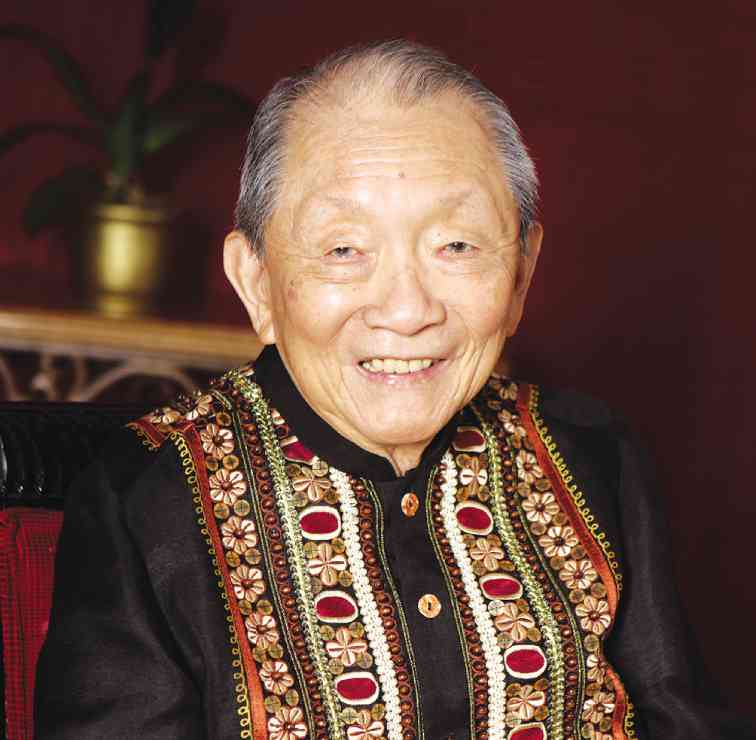Guru of Makati by day, Club Mwah habitué by night, Washington SyCip has slowed down only a wee bit after being laid up in the hospital last month.
Corporates and civil servants continue to beat a path to his office door. As in days past, he comes in at 7 a.m. and leaves in the afternoon.
SyCip is only 94.
“I have to keep working to pay my hospital bills,” he says, the twinkle in his eyes still there.
When Haruhiko Kuroda left the presidency of the Asian Development Bank to head the Bank of Japan, SyCip told his wife, Kumiko, to visit Manila often.
When she does visit, he hosts a lunch or dinner for her.
Recently, he treated her and their mutual friend to lunch at Umu, Dusit’s Japanese restaurant—his favorite.
The waiters there know he will ask for three kinds of tofu, one after the other, a main course, and green tea ice cream, all washed down with tea.
With the entry of the Sumitomo Mitsui Bank’s first Philippine branch, he talked about how he met Sumitomo’s CEO some years ago.
“Sumitomo had just built their guest house, and invited me to tour it with him—a grand experience,” he says.
Did he know Mr. Toyoda, too?
“Of course,” he says, “his son-in-law trained at ADB.
“It’s a pleasure to deal with the Japanese—they give such good service, and they’re so polite. In other countries, if you don’t give a tip, you get lousy service,” he says.
He should know, having been around the world.
SyCip continues to sit as a director or adviser on various boards.
In the Philippines alone, he is a director or an adviser of 38—that’s right, 38—of the largest corporations, financial institutions and foundations.
In the United States, he is an Honorary Counselor in the Asia Society Policy Center and an Honorary Life Trustee in Asia Society, and a Global Counselor on The Conference Board.
At the Columbia Business School, he is on the Board of Overseers.
“Mr. Global,” his secretary of several decades calls him. When he is away, Sylvia Sanchez has to courier local dailies to him every other day, to keep him abreast of local events.
How will Philippine banks fare in the global turmoil? No worries.
“Amando Tetangco isn’t just doing a good job, he’s doing a very good job,” SyCip says emphatically, “I trained him, you know.”
Tetangco is but one of many top figures in the local financial world who trained at SGV—the firm SyCip founded in 1946, together with Ramon Gorres and Fred Velayo, a friend since childhood, when they walked to public school together, and graduated from V. Mapa High School.
SyCip’s father, Albino, founder of China Bank, had a car, but he wanted his three sons to walk to and study in public schools.
Shifting gears to discuss various countries’ debt, he says, “The US owes a couple of trillion. But in Japan’s case, their debt is manageable. Japan owes the Japanese internally, because their people are very loyal and buy Japanese bonds.”
He continues, “vis-à-vis banks, our banks have to be very careful about lending to consumers,” particularly loans to house and condominium buyers.
“Saudi Arabia has 1.4 million Filipino workers. But at some point, the Saudi Arabians may feel the pressure to lay off expatriate workers because their economy is not as robust as it was in the past,” he says.
“It appears they may be planning to lay off as many as 300,000 Filipinos who will return to the Philippines. Should the workers have taken out housing loans on installment, their ability to repay their loans may be affected,” he adds.
But the Philippines’ biggest problem, SyCip says, is illiteracy.
“When a child is hungry and can’t go to school, you can’t expect him to be very intelligent,” he explains.
The conversation then turns to his most cherished theme: education.
“We must focus on education; you can’t get a job if you can’t read or write,” he says.
That is why he supports over 200,000 children by partnering with the Center for Agriculture and Rural Development Mutually Reinforcing Institutions (CARD MRI).
He, together with friends abroad in the SyCip-Kazarian Foundation, founded the Zero Dropout Program via the CARD MRI mechanism, which lends from P1,500 to P3,000 each to small livelihood borrowers, payable in three to six months, to enable their children to go to school.
“The poor are often more honorable than the rich,” says SyCip, noting the almost perfect repayment batting average.
SGV helps monitor the borrowers’ activities, giving them tips on how to grow their business while checking to ensure the borrowers’ children are in school.
Local corporates have jumped on the CARD MRI bandwagon, contributing support thanks to SyCip’s salesmanship—subtle but poignant and purposeful.
“Please ask people who can afford it to join us,” he says, obviously extremely enthusiastic about its success rate.
“The more people join us, the more children we can save,” he says.
So deep is SyCip’s commitment to children’s education that even before CARD MRI and its founder, Dr. Jaime Aristotle B. Alip, appeared on SyCip’s horizon, he was already actively involved with Synergeia Foundation, a potpourri of individuals, institutions and organizations striving to work with local governments to improve the quality of basic education.
Dr. Milwida M. Guevara, former Finance undersecretary, is its CEO, while SyCip is on the Board of Trustees.
SyCip (whose father was in the US capital when he was born, thus his name), is busy, indeed.
And at the rate SyCip is going, he will likely continue to have his hands full until Father Time says otherwise.
